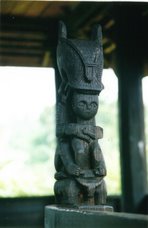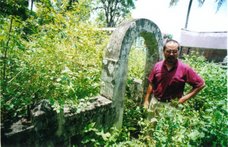Mining in National Parks against national interests
Didy Wurjanto*
Environmentalists were likely stunned when Forestry Minister Malam Sabat Kaban confirmed recently he had given approval for a foreign owned gold mining company to operate inside Batang Gadis National Park in Mandailing Natal regency, North Sumatra.
The approval was given by a minister who always preaches about the dangers of deforestation which could lead to national tragedies such as what recently happened in Sinjai, southern Sulawesi. Kaban has frequently vowed to promote ethical principles of sustainable development.
But now he is bargaining with the lives of more than 300,000 Madina people who depend on the surrounding forest. Some forestry experts believe the minister faced strong pressure to give the approval.
Kaban agreed to dispatch a team to review the exploration plan of PT Sorikmas, an Australian-based gold mining company. The plan states the government will allow the company to explore on 55,000 hectares within the 108,000 hectare Batang Gadis National Park. This plan has undoubtedly caused concern among the local government and nearby communities that the tailings from the operation will poison and destroy their agricultural lands and fisheries. Besides this there are concerns of natural disasters such as floods and landslides.
The Bohorok tragedy in North Sumatra was a strong warning to people in the province when severe flooding killed more than 170 people in the Bukit Lawang area in November 2003. Bukit Lawang was originally a water catchment area that should have been protected.
In the wake of the Bohorok tragedy, the governor of North Sumatra, the Madina regent, religious leaders and local community members initiated the establishment of Batang Gadis National Park. The park protects a giant watershed and is home to orangutans, Sumatran tigers, rhinos, hornbills, Malayan tapirs and other key species. The park is an important toehold for conserving the remaining large track of Sumatran rain forests. The establishment of the park was particularly important because it was done at the initiative of local people who feel a strong sense of ownership in the process rather than being something imposed by the government in Jakarta.
Batang Gadis is very important as a life-support system for more than 300,000 people in the regency not only because of its rich biodiversity but also because it protects water catchment areas that maintain the water supply to 13 districts surrounding the park and provides environmental protection to agricultural activities carried out by 73 villages, only two of which are located inside the park. There are no logging concessions or large-scale plantations operating within the park.
It is worthwhile to repeat that the process to obtain protected status for Batang Gadis National Park was a bottom-up effort initiated by the local government and communities, the first such effort under the new decentralized legal framework in Indonesia.
This park is now under local management in collaboration with local and international NGOs and the private sector. This model creates less dependency on the central government as it is the local administration that provides the necessary financial and legislative support.
The dispute between the mining company and the people of Madina began when the company under its working contract signed in 1999 claimed Batang Gadis National Park was part of its mining concession. However it is understandable that the people of Madina have been enthusiastic about protecting their rich natural resources, taking advantage of the presence of the 2004 Forestry Law.
This law protects national parks in Indonesia from mining and any other potentially destructive activities.
Among other conservation methods in Indonesia the establishment of a national park is among the most democratic way of protecting forests because the process involves local aspirations and initiatives.
Allowing open-pit mining in the wilderness zone of a national park is against the law. We cannot imagine how devastating it would be in Batang Gadis National Park, because Batang Gadis River, the main river and a source of life for the people of Madina, runs close to the mining exploration sites.
Therefore the Madina government, residents, environmentalists, conservationists and others should work hand in hand to provide accurate information to the decision-makers on the impacts and consequences of a mining operation in a conservation area.
There are arguments that the sanctity of a mining contract should be honored. Some ministries have expressed concern regarding the possible threat by the mining company to seek international arbitration, if not granted exemptions to carry on its work inside the national park.
But this time the Indonesian government should be better prepared. We could use this case to prove to the world how seriously we take the issue of sustainable development.
All Indonesian mining contracts state that the company must obey Indonesian laws and regulations including environmental protection laws. These regulations and laws may change from time to time to adjust to the needs of the environment and social conditions in the country.
The international community will support the Indonesian government in this matter because the global community also benefits from the biodiversity and climate-regulating role of our tropical forests.
*)The writer works for Conservation International. He can be reached at dwurjanto@conservation.org
http://www.conservation.or.id/home.php?modul=news&catid=28&tcatid=340&page=g_news.detail
Subscribe to:
Post Comments (Atom)


2 comments:
Lerry fans club artis SEO Tutorial
Dengan keadaan Bisnis Kolam Pancing Ikan, pasti benar-benar memberikan keuntungan bila kamu mulai mengurus kolam pemancingan sendiri.
Tetapi, dalam merinitis usaha ini, beberapa hal yang perlu kamu perhatikan.
Yok, langsung baca saja penjelasannya berikut ini!Bisnis Kolam Pancing Ikan Mas
Post a Comment